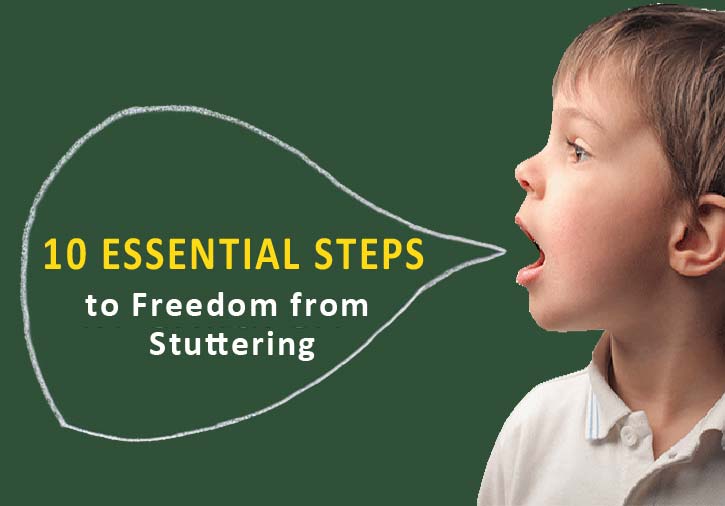- Opening Hours: 10am to 7pm(Monday-Saturday). Sunday on call appointment
- +91-9958309690, 8586929155 Book Appointment

Freedom from stuttering is a challenging journey, and while there may not be a guaranteed "cure," there are essential steps that can help individuals manage and improve their stuttering. It's important to remember that stuttering varies from person to person, and what works for one individual may not work for another. It takes a lot of work to be fluent and it takes much additional work to achieve freedom from stuttering. However, it is a feasible dream that starts with a lot of work on oneself. Here are some essential steps to consider:
Accept that stuttering is a part of which you are, not a character flaw. Develop self-acceptance and self-compassion. Be kind to yourself and understand that stuttering does not define your worth. Identifying Stuttering is not a easy task.
Stuttering often involves the repetition of sounds, prolong the sounds and speech blocks. For example "I want to go-go-go to the park.", “Ssssssee you later.", "I... [pause]...want to go to the store."
Consult a speech-language pathologist (SLP) who specializes in stuttering therapy. They can assess your stuttering and develop a personalized treatment plan. Attend regular therapy sessions and practice the techniques recommended by your SLP.
Learn and practice techniques like "fluency shaping" and "stuttering modification." These techniques can help you manage and reduce stuttering moments.
Practice deep breathing and relaxation techniques to reduce anxiety and tension, which can exacerbate stuttering. Work on speech exercises and drills prescribed by your SLP to improve your speech fluency.
Gradually expose yourself to challenging speaking situations. This helps desensitize you to the fear of stuttering and builds confidence.
Join a stuttering support group to connect with others who stutter. Sharing experiences and coping strategies can be empowering.
Read books, articles, and research about stuttering to gain a better understanding of the condition.
Practice mindfulness techniques to stay present in your speech and reduce anxiety. Manage stress through techniques like meditation, yoga, or exercise.
Work on improving overall communication skills, such as active listening and non-verbal communication, to compensate for moments of stuttering. Set achievable speech goals and celebrate your progress, no matter how small.
Consult a medical professional about the possibility of medications that may help reduce stuttering symptoms. Medication is typically considered when other interventions have not been effective.
Understand that managing stuttering is a long-term commitment. There may be ups and downs, but persistence is key.
Remember that stuttering is a unique experience for each individual, and what works best for you may require a combination of these steps. Seek ongoing support from a speech-language pathologist, and don't be discouraged by setbacks. With time and effort, many people can significantly improve their speech fluency and confidence.
 Healthy habits to take care of your voice.
Healthy habits to take care of your voice.
 Tips To Follow To Help You Stop Stuttering or Stammering
Tips To Follow To Help You Stop Stuttering or Stammering
 Getting used to new hearing aids
Getting used to new hearing aids
 When should we replace your hearing aids?
When should we replace your hearing aids?
 What Are Hearing Aids?
What Are Hearing Aids?
 Know More About Neurological Stroke Language Disorders!
Know More About Neurological Stroke Language Disorders!
 Advanvement of Technology In Digital Hearing Aids!
Advanvement of Technology In Digital Hearing Aids!
 Autistic Children - How Can Speech Therapy Assist?
Autistic Children - How Can Speech Therapy Assist?
 Stammering - Know About Its Cause And Treatment!
Stammering - Know About Its Cause And Treatment!
 How Speech Therapy Can Help Your Child?
How Speech Therapy Can Help Your Child?